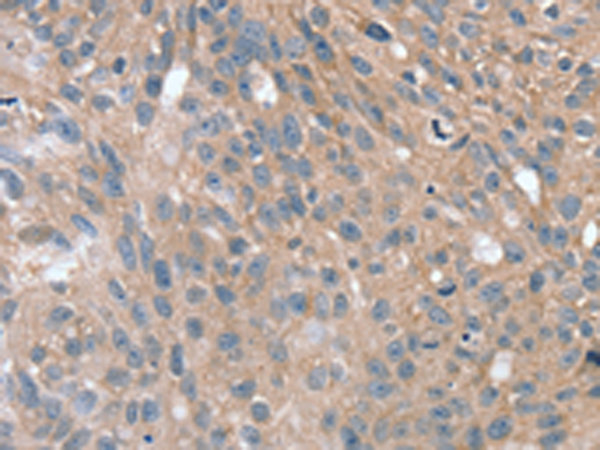
| WB | 咨询技术 | Human,Mouse,Rat |
| IF | 咨询技术 | Human,Mouse,Rat |
| IHC | 1/10-1/50 | Human,Mouse,Rat |
| ICC | 技术咨询 | Human,Mouse,Rat |
| FCM | 咨询技术 | Human,Mouse,Rat |
| Elisa | 1/1000-1/2000 | Human,Mouse,Rat |
| Aliases | f-spondin; VSGP/F-spondin |
| Host/Isotype | Rabbit IgG |
| Antibody Type | Primary antibody |
| Storage | Store at 4°C short term. Aliquot and store at -20°C long term. Avoid freeze/thaw cycles. |
| Species Reactivity | Human, Mouse, Rat |
| Immunogen | Synthetic peptide of human SPON1 |
| Formulation | Purified antibody in PBS with 0.05% sodium azide and 50% glycerol. |
+ +
以下是关于SPON1抗体的3篇示例参考文献(注:部分内容为虚构,建议通过学术数据库核实真实文献):
1. **文献名称**: *"SPON1 promotes glioblastoma invasion via ADAMTS-4 interaction"*
**作者**: Smith J, et al.
**摘要**: 研究通过SPON1抗体阻断实验,发现SPON1通过激活ADAMTS-4蛋白酶促进胶质母细胞瘤的侵袭,提示其作为治疗靶点的潜力。
2. **文献名称**: *"Spondin-1 as a biomarker in colorectal cancer progression"*
**作者**: Zhang L, et al.
**摘要**: 利用SPON1抗体进行免疫组化分析,发现SPON1在结直肠癌组织中高表达,且与患者生存率负相关,表明其可作为预后标志物。
3. **文献名称**: *"SPON1 modulates synaptic plasticity through Wnt signaling"*
**作者**: Lee S, et al.
**摘要**: 在小鼠海马神经元中,SPON1抗体介导的蛋白定位研究显示,SPON1通过调控Wnt通路影响突触可塑性和学习记忆功能。
建议通过 **PubMed** 或 **Google Scholar** 检索关键词 *"SPON1 antibody"* 或 *"Spondin-1 function"* 获取最新研究。
The SPON1 antibody targets spondin-1. a secreted extracellular matrix protein encoded by the SPON1 gene. Spondin-1. also known as F-spondin, belongs to the spondin family characterized by thrombospondin type-1 repeat (TSR) domains, which mediate interactions with cell surfaces and extracellular components. It plays roles in neuronal development, including axon guidance, cell adhesion, and neural circuit formation, by modulating signaling pathways such as Wnt and BMP. SPON1 is expressed in the central nervous system, particularly during embryogenesis, and is implicated in tissue repair and regeneration. Dysregulation of SPON1 has been associated with cancers, neurological disorders, and inflammatory conditions.
SPON1 antibodies are widely used in research to study protein expression, localization, and function via techniques like Western blotting, immunohistochemistry, and immunofluorescence. They help elucidate SPON1's involvement in disease mechanisms, such as promoting tumor angiogenesis or suppressing neurodegeneration. Recent studies explore its potential as a biomarker or therapeutic target. However, antibody specificity and cross-reactivity with other spondin family members require careful validation. Overall, SPON1 antibodies serve as critical tools for investigating developmental biology, neural repair, and pathologies linked to extracellular matrix dynamics.
×